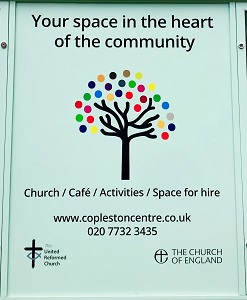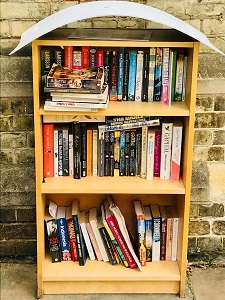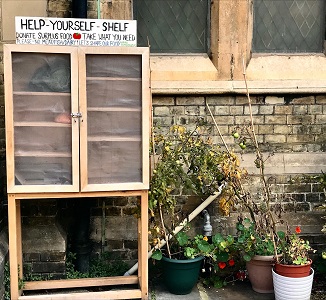On a bright, autumnal day in October, just before the second lockdown began, I had the pleasure of visiting one of our CRCW projects in Peckham, London. The informal meeting took place at Copleston Church and Centre and a small group of us sat and listened (at a suitable distance) to how the Church had responded to the needs of the community during the last eight months.
The imposing building itself was warm and the room we resided in was illuminated by the sun, making it almost feel like a summer’s day. It’s not a usual part of my role, as Administrator for Church Related Community Work and Special Category Ministry (which is a bit of a mouthful of a title I’ll admit, but bear with me) to look around and get a feel for a project myself, but it was too good an opportunity to miss. I see visiting a project as a real treat, as it helps to provide a much more illuminating and informative view, as opposed to simply reading about a project on paper, which is adequate, but not quite the same.
day. It’s not a usual part of my role, as Administrator for Church Related Community Work and Special Category Ministry (which is a bit of a mouthful of a title I’ll admit, but bear with me) to look around and get a feel for a project myself, but it was too good an opportunity to miss. I see visiting a project as a real treat, as it helps to provide a much more illuminating and informative view, as opposed to simply reading about a project on paper, which is adequate, but not quite the same.
Not only was the building itself surprisingly warm and light (perhaps I had perceived a building of such size to feel cold, dark with a slight aroma of mothballs) the people were too, as I also received a heartfelt welcome from everyone I encountered there, whether it be in person or those attending via Zoom. One of the first thoughts I had, was how incredible it is despite the lockdown and all the restrictions that had been imposed, how resilient people are. The project and all those who worked within it carried on and were (and continue to be) busier than ever. Fatigue has certainly settled in, for the work hasn’t stopped, it has just adapted and evolved to deliver a platform to support and enhance the work of the project in such strange and uncertain times. Everyone deserves a holiday though and I hope the staff there do get their well-earned rest at some point!
Jo, the Church Related Community Worker (CRCW) for the project said that isolation within the community had become a big problem, particularly amongst the older generation and those who were shielding. The Centre received a grant, to help support those who were particularly vulnerable (focusing on mental health services and older residents) and eventually, as people were able to enter and use the building once more, with all the safety guidelines well in place, more services resumed. Jo said, ‘people know it’s a safe space’ and as we get used to the presence of the virus, it’s easier to maintain those strict standards and adapt, which must have seemed so daunting at first. The Centre was equipped to offer counselling, art therapy and an art café, albeit with fewer people and not continuously, as rules tightened and relaxed. This was still more than many other community spaces could do. The Church could also still offer worship, although mostly via Zoom, which has practically become the norm for so many households these days.
It has also been a time to boost those partnerships with local organisations even further by working together more collaboratively,  although in a slightly different way. These partnerships are crucial in order to create joined up thinking and targeted support for the community.
although in a slightly different way. These partnerships are crucial in order to create joined up thinking and targeted support for the community.
Another positive to come out of such a negative time for so many, is the increase in the number of volunteers at the Centre. People who have never volunteered before now began to give their time and help with a whole host of activities and tasks. The ‘bookshelf’, which sits outside the building was suggested by a local member of the community and invites people to share books. It is a lovely idea and has been well received. There’s also a ‘help yourself’ food shelf, and again, local people are giving what they can and receiving what they need. The team at the Centre recognise that the impact of COVID-19 will be felt for many years to come and much of their future planning will involve spirituality and resourcing and supporting the community in ever changing times.
Jo, who works very closely with Edward, the Vicar at Copleston Church believes that one of their most empowering tools has been the Mutual Aid group, which was set up in response to people within the community wanting to volunteer and work together to transform where they live. Many had never volunteered before and the hope is that this group will continue to flourish, and not only be an asset to the Church, for which the gain practical support and advice, but also to build upon strong relationships within the neighbourhood.  The group consists of around 160 volunteers, who manage themselves. Other groups have popped up (some using the Copleston model) and ‘people are just getting on with it and getting to know each other better’ Jo told us.
The group consists of around 160 volunteers, who manage themselves. Other groups have popped up (some using the Copleston model) and ‘people are just getting on with it and getting to know each other better’ Jo told us.
It’s an exciting project to see unfold and I cannot wait to be invited back post COVID-19 (if there will be such a thing) to see how much more has been achieved. Right now though, I really applaud what they have managed to do and what they continue to do. It’s incredibly inspiring.
If you would like to see the full range of activities and support on offer at the Copleston Church and Centre visit their website for full details.
Copleston have provided us with two short films, which really sum up who they are and what they do. View them on our URC YouTubeChannel here:
Jo Patterson – Estate Ministry (5mins, 25 secs)
A Day at Copleston filmed in March 2020 (8mins 45secs)
If you would like to know more about Church Related Community Work, you can follow us on Facebook, Twitter or Instagram and read all about us on our CRCW webpages.





